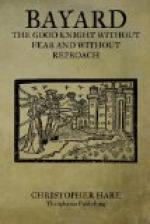During three years young Bayard remained as a page in the service of the Seigneur de Ligny, being trained with the utmost care in all that would be needful to him in his profession of arms.
He won so much favour from his lord that at the early age of seventeen he was raised from his position as a page to that of a squire, and appointed man-at-arms in the General’s company, being retained at the same time as one of the gentlemen of the household, with a salary of 300 livres. As a man-at-arms Bayard would have under him a page or varlet, three archers, and a soldier armed with a knife (called a “coutillier"). Thus, when we find a company of men-at-arms spoken of, it means for each “lance garnie,” or man-at-arms, really six fighting men on horseback.
When King Charles VIII. found himself once more in his loyal city of Lyons, it chanced that a certain Burgundian lord, Messire Claude de Vauldray, a most famous man-at-arms, came to the King and proposed that he should hold a kind of tournament, called a “Pas d’Armes,” to keep the young gentlemen of the Court from idleness. He meant by this a mimic attack and defence of a military position, supposed to be a “pas” or difficult and narrow pass in the mountains. It was a very popular test of chivalry, as the defender hung up his escutcheons on trees or posts put up for the purpose, and whoever wished to force this “pas” had to touch one of the escutcheons with his sword, and have his name inscribed by the King-at-arms in charge of them.
There was nothing that King Charles VIII. loved better than these chivalrous tournaments, and he gladly gave his consent. Messire Claude de Vauldray at once set about his preparations, and hung up his escutcheons within the lists which had been arranged for the coming tournament.
Young Bayard, whom every one called Picquet, passed before the shields and sighed with longing to accept the challenge and so improve himself in the noble science of arms. As he stood there silent and thoughtful, his companion, called Bellabre, of the household of the Sire de Ligny, asked him what he was thinking of. He replied: “I will tell you, my friend. It has pleased my lord to raise me from the condition of page into that of a squire, and I long to touch that shield, but I have no means of obtaining suitable armour and horses.” Then Bellabre, a brave young fellow some years older than himself, exclaimed: “Why do you trouble about that, my companion? Have you not your uncle, that fat Abbe of Ainay? I vow that we must go to him, and if he will not give you money we must take his cross and mitre! But I believe that when he sees your courage he will willingly help you.”




